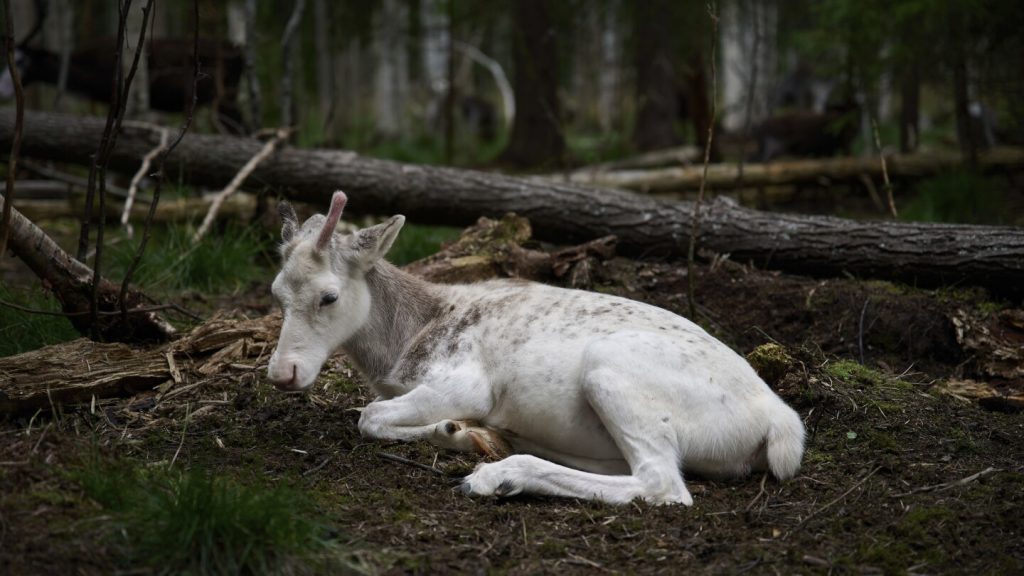KIRUNA, Sweden (AP) — High atop the Luossavaara Mountain in northern Sweden, Sami reindeer herder Lars-Marcus Kuhmunen mapped out a bleak future for himself and other Indigenous people whose reindeer have roamed this land for thousands of years.
An expanding iron-ore mine and a deposit of rare-earth minerals are fragmenting the land and altering ancient reindeer migration routes. But with the Arctic warming four times faster than the rest of the planet, herders say they need more geographic flexibility, not less, to ensure the animals’ survival.
If a mine is established at the deposit of rare-earth minerals called Per Geijer, which Sweden heralds as Europe’s largest, Kuhmunen said it could completely cut off the migration routes used by the Sami village of Gabna.
That would be the end of the Indigenous way of life for Kuhmunen, his children and their fellow Sami reindeer herders, he said, in this far-north corner of Sweden some 200 kilometers (124 miles) above the Arctic Circle.
“The reindeer is the fundamental base of the Sami culture in Sweden,” Kuhmunen said. “Everything is founded around the reindeers: The food, the language, the knowledge of mountains. Everything is founded around the reindeer herding. If that ceases to exist, the Sami culture will also cease to exist.”
Sami reindeer herders follow generations of tradition
Sami herders are descended from a once-nomadic people scattered across a region spanning the far north of Sweden, Norway, Finland and the northwestern corner of Russia. Until the 1960s, members of this Indigenous minority were discouraged from reindeer herding, and the church and state suppressed their language and culture.
In Sweden alone there are at least 20,000 people with Sami heritage, though an official count does not exist because an ethnicity-based census is against the law. Today, a Sami village called a sameby is a business entity dictated by the state, which determines how many semi-domesticated reindeer each village can have and where they can roam.
“It’s getting more and more a problem to have a sort of sustainable reindeer husbandry and to be able to have the reindeers to survive the Arctic winter and into the next year,” said Stefan Mikaelsson, a member of the Sami Parliament.
In the Gabna village, Kuhmunen oversees about 2,500 to 3,000 reindeer and 15 to 20 herders. Their families, some 150 people in total, depend on the bottom line of the business.
Even before the discovery of the Per Geijer deposit, they had to contend with the expanding footprint of Kiirunavaara. The world’s largest underground, iron-ore mine has forced the village’s herders to lead their reindeer through a longer and harder migration route.
Mining could reduce dependence on China but hurt Sami herders
Swedish officials and LKAB, the state-owned mining company, say the proposed Per Geijer mine could reduce Europe’s reliance on China for rare-earth minerals. LKAB hopes to begin mining there in the 2030s.
Besides being essential to many kinds of consumer technology, including cellphones, hard drives and electric and hybrid vehicles, rare-earth minerals also are considered crucial to shifting the economy away from fossil fuels toward electricity and renewable energy.
But if work on Per Geijer goes forward, Kuhmunen said there will be no other routes for the Gabna herders to take the reindeer east from the mountains in the summer to the grazing pastures full of nutrient-rich lichen in the winter.
The village will contest the mine in court but Kuhmunen said he is not optimistic.
“It’s really difficult to fight a mine. They have all the resources, they have all the means. They have the money. We don’t have that,” Kuhmunen said. “We only have our will to exist. To pass these grazing lands to our children.”
Darren Wilson, LKAB’s senior vice president of special products, said the mining company is seeking solutions to assist the Sami herders, though he would not speculate on what they might be.
“There are potential things that we can do and we can explore and we have to keep engaging,” he said. “But I’m not underestimating the challenge of doing that.”
Climate change’s impact on reindeer husbandry
Climate change is wreaking havoc on traditional Sami reindeer husbandry.
Global warming has brought rain instead of snow during the winter in Swedish Lapland. The freezing rain then traps lichen under a thick layer of ice where hungry reindeer can’t reach the food, according to Anna Skarin, a reindeer husbandry expert and Swedish University of Agricultural Sciences professor.
In the summer, mountain temperatures have risen to 30 degrees Celsius (86 Fahrenheit) and left reindeer over-heated and unable to graze enough to gain the weight needed to sustain them in winter.
Some in Sweden suggest putting the reindeer onto trucks to ferry them between grazing lands if the Per Geijer mine is built. But Skarin said that isn’t feasible because the animals eat on the move and the relocation would deny them food to be grazed while walking from one area to another.
“So you’re kind of both taking away the migration route that they have used traditionally over hundreds and thousands of years,” she said, “and you would also take away that forage resource that they should have used during that time.”
For Kuhmunen, it would also mean the end of Sami traditions passed down by generations of reindeer herders on this land.
“How can you tell your people that what we’re doing now, it will cease to exist in the near future?” he said.
___
Pietro De Cristofaro in Kiruna, Sweden, contributed to this report.
___
The Associated Press’ climate and environmental coverage receives financial support from multiple private foundations. The AP is solely responsible for all content. Find the AP’s standards for working with philanthropies, a list of supporters and funded coverage areas at AP.org.


